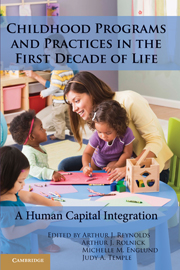Book contents
- Frontmatter
- Contents
- Contributors
- Foreword: The Essential Role of Youth Development by Robert H. Bruininks
- Acknowledgments
- 1 Early Childhood Development and Human Capital
- PART I PRENATAL AND INFANT PROGRAMS
- PART II PRESCHOOL EDUCATION
- PART III KINDERGARTEN AND EARLY SCHOOL-AGE SERVICES AND PRACTICES
- 12 Opportunity in Early Education: Improving Teacher–Child Interactions and Child Outcomes
- 13 School Readiness and the Reading Achievement Gap: Can Full-Day Kindergarten Level the Playing Field?
- 14 Small Classes in the Early Grades: One Policy, Multiple Outcomes
- PART IV ECONOMIC SYNTHESES OF EARLY CHILDHOOD INVESTMENTS
- Appendix Question-and-Answer Sessions
- Name Index
- Subject Index
- References
14 - Small Classes in the Early Grades: One Policy, Multiple Outcomes
Published online by Cambridge University Press: 05 June 2012
- Frontmatter
- Contents
- Contributors
- Foreword: The Essential Role of Youth Development by Robert H. Bruininks
- Acknowledgments
- 1 Early Childhood Development and Human Capital
- PART I PRENATAL AND INFANT PROGRAMS
- PART II PRESCHOOL EDUCATION
- PART III KINDERGARTEN AND EARLY SCHOOL-AGE SERVICES AND PRACTICES
- 12 Opportunity in Early Education: Improving Teacher–Child Interactions and Child Outcomes
- 13 School Readiness and the Reading Achievement Gap: Can Full-Day Kindergarten Level the Playing Field?
- 14 Small Classes in the Early Grades: One Policy, Multiple Outcomes
- PART IV ECONOMIC SYNTHESES OF EARLY CHILDHOOD INVESTMENTS
- Appendix Question-and-Answer Sessions
- Name Index
- Subject Index
- References
Summary
The idea that small classes are desirable for instruction is not new; indeed, it dates back at least to biblical times (Angrist & Lavy, 1996). In the 20th and 21st centuries, small classes, a distinguishing feature of American private schools and a fundamental component of all remedial programs, have been posited as a way to bolster student achievement in public schools generally.
Tennessee's Project STAR (Student Teacher Achievement Ratio) is not a “program” in the traditional sense. It was a large-scale experiment to test the effectiveness of this basic principle of school organization – that is, arranging classes in the early grades so they have a relatively small number of students in a classroom with a full-time teacher.
Because of the reported effectiveness of small classes in STAR, the experiment has been followed by class size reduction (CSR) initiatives across the country. According to one recent survey, 33 states had statewide CSR programs for the early grades, of which 13 were mandatory (McCabe, 2006). The number of districts with their own CSR programs is undocumented but probably quite large. President Clinton introduced a nationwide CSR program in 1998, which was discontinued by the Bush administration.
STAR has also been followed by additional research on small classes, by several analyses of CSR costs and benefits, and by some arguments that the research on CSR or the conclusions drawn from the research is faulty. This chapter summarizes these developments.
Information
- Type
- Chapter
- Information
- Childhood Programs and Practices in the First Decade of LifeA Human Capital Integration, pp. 287 - 308Publisher: Cambridge University PressPrint publication year: 2010
References
Accessibility standard: Unknown
Why this information is here
This section outlines the accessibility features of this content - including support for screen readers, full keyboard navigation and high-contrast display options. This may not be relevant for you.Accessibility Information
- 4
- Cited by
